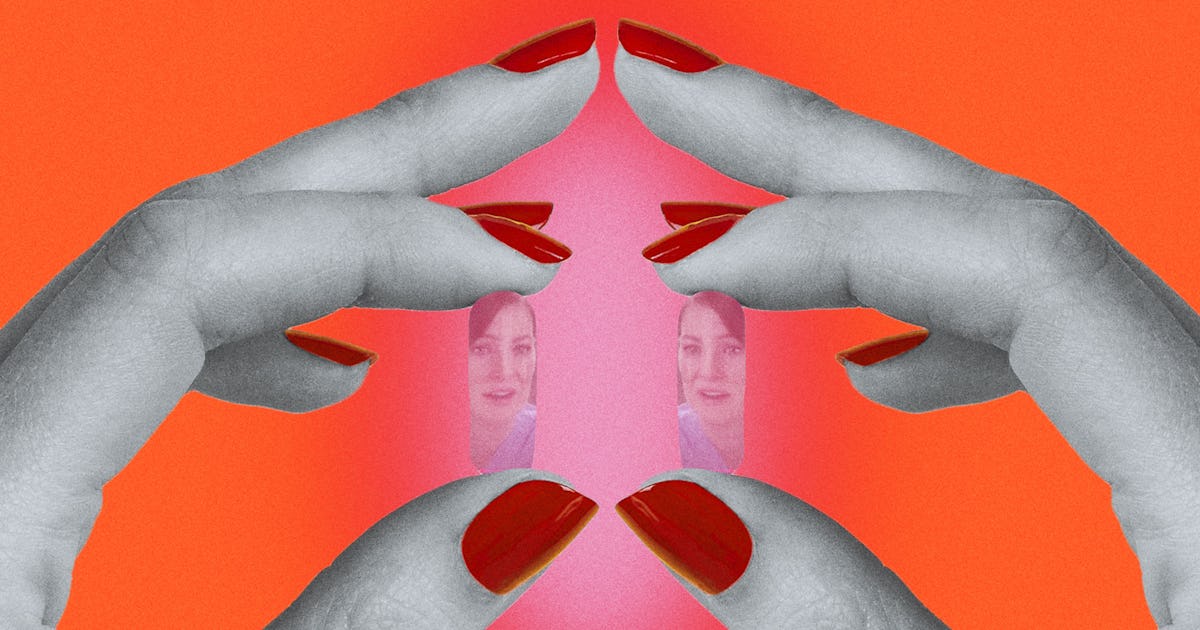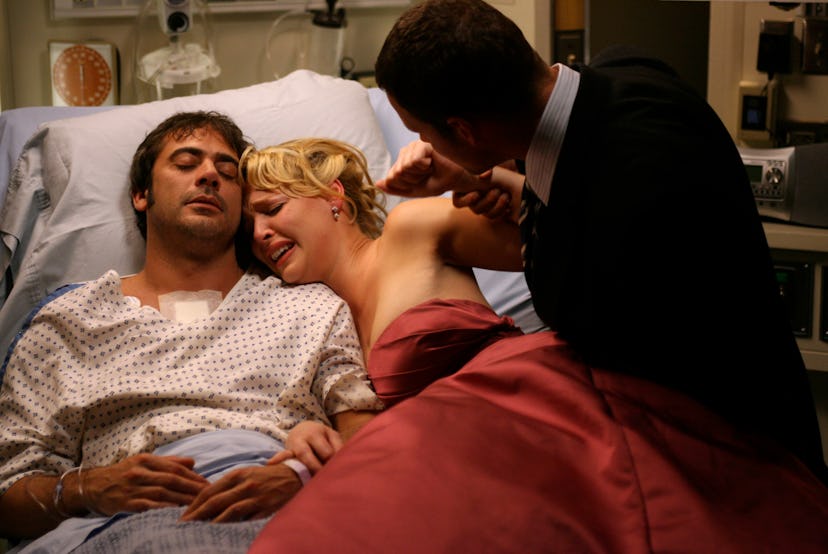
Uh Oh, She’s Watching ‘Grey’s Anatomy’ Again
Without a doubt, they were the worst months of her life. “I was recently divorced and was fired from my job of five years — not laid off, full-on fired,” says Crystal Orraca, 41, from Brooklyn. Unable to sleep, there was only one thing that could stop her mind from spinning: the chaotic lives of the doctors at Seattle Grace, the backdrop for ABC’s long-running medical drama Grey’s Anatomy. Orraca started off watching with her daughter, but soon, she was glued to the screen day and night. “I don’t know if it was the ‘tragedy porn’ aspect of it,” she says. “As sh*tty as I was doing, someone on the show was doing worse.”
Grey’s — which premiered 20 years ago this spring — might seem like a weird place to find sanctuary. After all, it’s a show where screams of “She’s crashing!” soundtrack a constant cycle of deaths and disasters. (If you find yourself warming to a character, heads-up: They’re probably about to get dramatically killed off.) But whether it’s the escapism of doctors who look like models or inspiration in the form of Dr. Meredith Grey, one of TV’s ultimate survivors, the show has become its own type of therapy for viewers going through it. To many millennials, in fact, embarking on a Grey’s rewatch has become synonymous with not doing so great: A friend tells you at brunch that she’s been spending time with Meredith & Co.? You might want to check on her.
“I return to it over and over when I’m going through a depressive episode or when I need to be surrounded by characters I know and love,” says Erin Valentine, a 31-year-old from Texas who first watched the show when she was studying abroad in college and deeply missing her support system. Junghee, 38, from Tokyo, revisits Grey’s whenever she needs to compartmentalize something painful happening in her life. “It’s a barometer for when I want to thrive, despite the things that aren’t going well for me,” she says. “I feel like it gives me more appetite for life.”
A Grey’s rewatch can even be an early sign that someone is having a rough go of it. Sarah, a 33-year-old from Miami, returns to the show when her mental health is “in the gutter” — whether she’s totally aware of it or not. “When I’m in a better mental space, I tend to be more open to new shows, or going out and foregoing much TV in general,” she says. “But when things get bad, I get overwhelmed… [the familiarity] is such a draw.” (In the interest of not broadcasting their mental-health low points across the internet, some people interviewed for this story asked to be identified only by their first names.)
When embarking on a rewatch, Sarah already knows which episodes she wants to pay close attention to, so she can “relive the moment again,” and which ones she wants to avoid. In Season 14, an undiagnosed brain tumor causes Dr. Amelia Shepherd to behave self-destructively until doctors finally figure out what’s up. “That hits a little too close to home for me, so I usually skip,” she says. “But that sometimes makes me question myself: Am I so down and mental that I can’t handle someone else’s tough time? Even a fictional person?”
Not every Grey’s rewatch is a “crisis rewatch” for writer Alim Kheraj, who has previously praised the show’s reliable comfort in tough times. “Sometimes, I just get an itch that only Mer and Christina can scratch, especially in those first two seasons,” he explains. But if he finds himself drawn to the show’s grimmer moments, it’s a sure sign of a downward turn. “Things get really dark in the third and fourth seasons, especially for Meredith,” he adds. “When I get the itch for those — as well as the mass shooting episodes or the plane crash episodes in Season 8 — that’s when I know things aren’t quite right.”
Here’s a small sampling of what Meredith Grey has endured across the show’s 21 (and counting) seasons: being raised by a cruel mother and absent alcoholic father; a bomb scare; a near-drowning; a mass shooting; a plane crash that claimed the life of her formerly estranged half-sister; deciding to withdraw life support for her husband, Dr. Derek “McDreamy” Shepherd, a pioneering brain surgeon who ended up brain-dead after a crash; and the deaths of several close friends and colleagues in a never-ending series of unexpected tragedies.
The character, as portrayed by Ellen Pompeo, has come to represent the paragon of resilience to people like Emily Gould, the author and New York features writer who binge-watched every season of Grey’s during a period of mental-health struggles. “Meredith has been so deeply traumatised repeatedly, and every time, she has managed to bounce in a way that is, somehow, totally believable,” says Gould, whose other depression-watches included Girls 5Eva and The Good Wife. (The only Grey’s season Gould never returns to is Season 17, which tackled COVID: “We look to the show for the escapism of people having sex in closets, and when people are not having sex in closets to balance out all the trauma, the show really loses a lot of its momentum.”)
If Meredith isn’t inspiring viewers to press on, she’s at least giving them some perspective. “I may think I have problems — but Meredith is tampering with a clinical trial?!” says Elizabeth Galanti, 28, from Nashville. “The characters make such insane and poor choices that it completely dwarfs anything that could happen to a normal person.”
“Meredith is such a flawed character,” adds Victoria Coady, a 41-year-old Deloitte management consultant. “You see her making mistakes pretty relentlessly. But she seems aware that she’s not perfect and wants to grow from her mistakes. And most importantly, she has friends around her to make sure that she does.”
Coady told me she’s rewatching Grey’s in a period of grief after three of her relatives passed away in short succession. The show’s appeal to her in this time is twofold: First, she can self-soothe with the uplifting storylines — yes, they happen sometimes! — like when doctors find a miracle cure or a patient beats the odds. And even when she’s crying about the sad moments, she says it feels just far enough removed from her own life to be more “approachable” mentally.
This lines up with something psychologist Ian MacRae told me when I asked for his take on Grey’s depression viewing. He thinks such rewatches might help activate the parts of our brains that deal with problem-solving, but in “ways that feel less threatening or scary, because it’s not directly about you.” It can seem much easier to untangle a situation — even something as complicated as grief — when we’re not in the middle of it. You know the classic Grey’s trope of doctors talking about a patient when they’re really talking through something going on in their personal lives? It’s kind of like that.

For many people, rewatching Grey’s seems to be a secret — or at least solo — ritual. Sarah, the fan from Miami, says she doesn’t tell anyone about her rewatches until “after the bad times are over, or are clearing up.” Sometimes, when friends ask what she’s been watching lately, she’s not sure how to answer. “Depending on the person, I might lie because of some perceived judgement I’ve made up,” she adds. “It feels like a guilty habit when it’s really just a signal that I’m not doing great, but for that I usually keep it to myself.”
Holly Price, 39, from Ottawa, is pretty strict about watching the show when she’s home alone and her husband is at work or running errands. “It’s my secret show just for me,” she says. “It’s my hour of solo self-care. It’s sort of like therapy.”
Price first watched Grey’s as a teenager, but she picked up the show again during the pandemic. “I had been feeling super emotionally numb and disconnected from my body and my brain as a result of the massive stress of lockdowns and losing loved ones to the disease,” she explains. And when she started from the beginning, she cried for the first time in months. “It sort of cracked me open. It brought me back into myself.”
That kind of emotional release is a hallmark of Grey’s. Chelsea Nachman, a comedian from New York, describes the show as the TV equivalent of “putting on a sad song when you want to cry.” That’s partly because many of its iconic moments have been soundtracked by equally iconic sad songs — like Snow Patrol’s “Chasing Cars,” Ingrid Michaelson’s “Keep Breathing,” The Fray’s “How to Save a Life,” and Butterfly Boucher’s “A Bitter Song.” “There is rarely a time I hear a song and don’t say, ‘This is from Grey’s,’” Nachman says. “If I hear these familiar chords and melodies out of context, I’m immediately brought into the scene they come from.”
The secret to a cathartic Grey’s moment? The messy, sometimes contradictory emotions all wrapped up in one. “Grey’s doesn’t shy away from the world being relentlessly tough and hard, but there are so many moments of joy within that,” says Jeffrey Ingold, who has worked as an LGBTQ+ consultant on the Netflix dramas Baby Reindeer and Heartstopper. “I always think about the scene, right after George’s funeral, when the group sits together and they start hysterically laughing. It’s one of those moments that feels like a warm blanket.”
“I come back to Meredith’s mother telling her ‘the carousel never stops turning’ over and over again when I’m going through a hard time,” says Negar, a 28-year-old from Toronto. “I take it to mean ‘this too shall pass,’ but almost more realistic. It’s comforting to think of healing and growth as never-ending, like a carousel that doesn’t stop turning.”
As it enters its third decade, Grey’s Anatomy might be past its peak, but its core message remains the same: Hang in there. “People might sh*t on Grey’s as being a network soap, but especially in the first 12 seasons, there is this indelible appetite for life, even as people are constantly dying,” Kheraj says. “The doctors go through hell, but they keep going. That’s hopeful.” If Meredith Grey can narrowly escape death multiple times and lose almost every person she’s ever loved and still flawlessly perform a never-attempted-before surgery, then you can probably get up and take a shower today.
And that is the real magic of Grey’s. What looks like escapism at first becomes another way to engage with your problems, not run from them. “I would follow Shonda Rhimes into the abyss, and during some especially traumatic episodes, it feels like I already have,” says Nachman, the comedian. To her, Grey’s will always be more than just a comfort show. “It’s knowing I’m going to feel it all, and being able to fall freely into that,” she says. “And if I get hurt, knowing there are some really hot doctors who can save me.”









